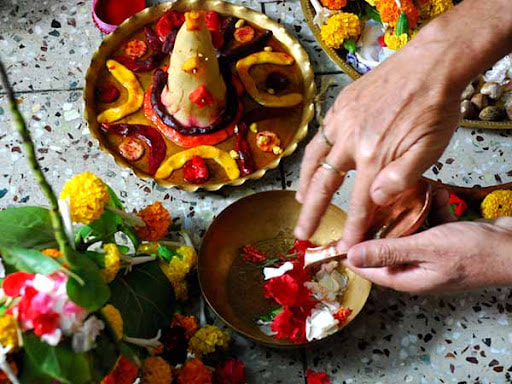|
Now-a-days, the younger generation rejects Hinduism because they find it difficult to believe many of the concepts. The spirit of rituals is still valid. But the loss of simplicity and economy derailed them from their original purpose. Rituals and ceremonies, involving skills and modes of action learnt painstakingly by our ancestors and transmitted inter-generationally to become part of collective memory and cultural repertoire, are necessary. However, during passage of time malicious influence of certain dominant sections of society and invaders polluted the Hindu sacred rituals. The purpose of these rituals is to purify, renew society, bridge over critical moments, and stimulate or resuscitate the vital powers of nature.
In Hinduism, rituals are not only for life time but also for before birth and after death. Rituals forge a sense of belonging and common identity which transforms individuals into cohesive communities. Participating in collective rituals increases generosity. Psychology of the Indian rituals & tradition is an inner discipline in search of realizing truth and perfection in the human condition. Purposes of Rituals: The purposes of rituals are varied; with religious obligations or ideals, satisfaction of spiritual or emotional needs of the practitioners, strengthening of social bonds, social and moral education, demonstration of respect or submission, stating one's affiliation, obtaining social acceptance or, sometimes, just for the pleasure of the ritual itself. The rituals in Hinduism are especially important for the Householders to achieve the three of the four important aims of human life, namely Dharma, Artha and Kama. Rituals are performed to bring spirituality into human life and inculcate feelings of devotion and religiosity. Rituals in Hinduism are designed to built-in selflessness and to ingrain the process of surrender in day-to-day life. Scriptures for Rituals: Four Vedas and Hindu scriptures - Brahmanas, Aranyaka and Sutras. A collection of sutras becomes a text containing rules & directions with which the teachings of ritual, philosophy, grammar, or any field of knowledge can be woven. When the Hindu rituals are done as prescribed, these attain great powers, fulfil the desires and achieve their goals. The rituals serve as a bridge between our human beings and the divine and that of ancestors. Physical and mental purity are vital to the observance of Hindu rituals. Important Rituals in Hinduism: A few rituals are listed hereunder. Five daily Yajnas to share –
These include study of Hindu scriptures, daily pooja, feeding & respecting invited or uninvited guests (Atithi devo bhava), first roti (bread) to cow and the last to dog etc. Four stages of life cycle - In Hinduism, entire life is divided into four objects of life and life stages (Ashrams) –
Hindu’s sixteen Sanskars – Sixteen sanskars (before conception till after death) are offered to God to develop divine consciousness in the individual which help him to lead better life and to orient his sub-conscious mind for total surrender. These are as under:
Hindu rituals to care environment –
Pilgrimages in Hinduism to surrender – Pilgrimages are for both inward as well outward journeys. Even thought of travelling to pilgrim locations brings positive change in state of mind. It connects with all walks of people and brings humility. It detaches the mind from worldly affairs and simultaneous chanting concentrates the mind so essential for meditation & surrender. Hindu Festivals to share and surrender – Celebrating festivals on community basis, not only bring personal happiness but also play a pivotal in social cohesion which brings peace, harmony and happiness. It is sharing and enjoying. Further, festivals bring the individuals closer to the almighty by fasting (upavaasa), special prayer, japa, havan/Yajna, meditation, donation/daan, etc. These practices reduce indulgence in sensual pleasure & distractions of mind, improve focus & humility, remind high standards & morals followed by the deities worshipped. Hence, the rituals in Hinduism discarded as blind faith, actually convert selfishness into total surrender to facilitate moksha, total surrender and liberation. This makes this life happy and liberates the one from rebirth.
0 Comments
Leave a Reply. |
Archives
March 2022
Categories |

 RSS Feed
RSS Feed